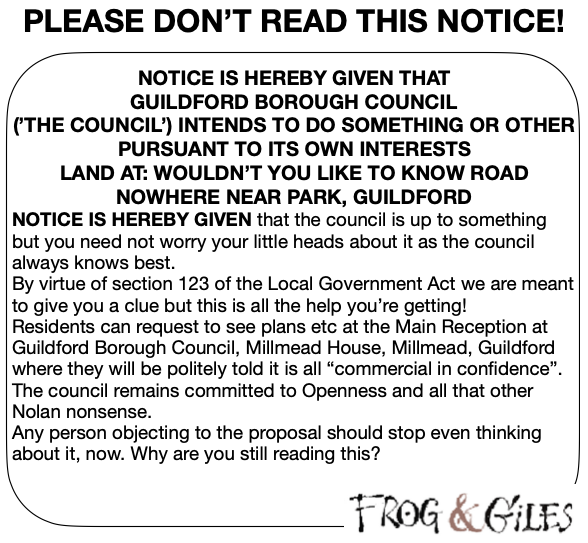 Abraham Lincoln
If given the truth, the people can be depended upon to meet any national crisis...
Abraham Lincoln
If given the truth, the people can be depended upon to meet any national crisis...
 Guildford news...
for Guildford people, brought to you by Guildford reporters - Guildford's own news service
Guildford news...
for Guildford people, brought to you by Guildford reporters - Guildford's own news service
Millestones in Rock ‘n’ Roll History: Heartbreak Hotel
Published on: 29 Jun, 2018
Updated on: 29 Jun, 2018
In our series of articles focusing on Milestones in Rock ‘n’ Roll History, Dave Reading features a classic song about heartbreak that proved inspirational in the development of modern music.
There’s a poignant story in the news archives about a friendless, unknown man who jumped to his death from a hotel window in Miami. The year was 1955. According to press reports, police who entered the hotel room found a suicide note containing a one-line epitaph: “I walk a lonely street”.
 Next day a brief news item about the tragedy was spotted by songwriter Tommy Durden, who was so moved by what he’d read that he decided to write a blues song expressing the man’s loneliness. When he took his idea to fellow songwriter Mae Boren Axton, she told him: “I’m going to put a heartbreak hotel at the end of that lonely street.”
Next day a brief news item about the tragedy was spotted by songwriter Tommy Durden, who was so moved by what he’d read that he decided to write a blues song expressing the man’s loneliness. When he took his idea to fellow songwriter Mae Boren Axton, she told him: “I’m going to put a heartbreak hotel at the end of that lonely street.”
The song they wrote together became Elvis Presley’s first million-seller back in 1956. Heartbreak Hotel was one of those rare songs that changed people’s lives. Or to be more accurate, it changed the way they viewed themselves. Teenagers who were struggling to find a clear direction in life now knew exactly what they wanted. They wanted to be just like that guy on the record.
Keith Richards of the Rolling Stones was 12 when he first heard Heartbreak Hotel just after its release. Decades later, in his autobiography, he recalled the impact it made.
“… the one that really turned me on, like an explosion one night, listening to Radio Luxembourg on my little radio when I was supposed to be in bed and asleep, was ‘Heartbreak Hotel.’ That was the stunner. I’d never heard it before, or anything like it. I’d never heard of Elvis before. It was almost as if I’d been waiting for it to happen. When I woke up the next day I was a different guy.”
The song reached Richards on a primal level. No one had told him it was a great song or that it would be the next big thing. He just knew what he felt. And from that moment he understood what he wanted to do with his life.
That experience was shared by John Lennon, who was 16 at the time. The Beatles authority Mark Lewisohn reports that the young Lennon was overawed by the “power and grace” of Presley’s performance. Recalling its effect years later, Lennon said the song made his hair stand on end.
George Harrison described Heartbreak Hotel as his epiphany – the catalyst that ignited his ambition to play rock ‘n’ roll.
The UK record charts in the early 1950s had been dominated by what is disparagingly termed easy listening music. When you turned on the radio, you were likely to hear Ronnie Hilton, a Yorkshire-born crooner with a light operatic style; or Ruby Murray, an Irish-born singer of plaintive, tuneful ballads with lush, orchestral arrangements; or Eddie Calvert, the trumpeter from the North of England who scored a No.1 hit in 1954 with the German melody Oh Mein Papa.
If you were a restless teenager, this was what you were stuck with: the bland vinyl 78s brought home by your mum and dad and played on the family radiogram, a bulky piece of wooden furniture that combined a radio and a record turntable.
But everything was about to change. In January 1956, two days after his 21st birthday, Presley recorded his first five tracks for RCA including Heartbreak Hotel.
At first the producer of the sessions, Steve Sholes, was on the verge of panic. He thought that with Presley, RCA had bought a dud and he was equally convinced that someone had picked the wrong song: a strange, gloomy lament that was at odds with everything else in the charts at that time.
For Sholes, the main problem was in getting the right sound. He was trying to recapture the distinctive echo that producer Sam Phillips had achieved during Presley’s earlier sessions with Sun Records, but he couldn’t work out how to do it.
Eventually he solved the problem by placing a mike and an amplifier at opposite ends of the long hallway at the front of the building and by feeding that back into the main room. By today’s standards, it was a primitive solution to a tricky problem.
Presley gave the song everything he had but after the session ended, and the result was heard, there was gloom and despondency among the RCA hierarchy. No one had heard anything like it. The extraordinary thing is, throughout the song’s two minutes and six seconds, there’s not a lot going on: just a mournful voice reaching out, accompanied by a sparse arrangement of guitar, double bass and piano.
The drumming is effectively underplayed, so that you have to listen hard for it. No one is overshadowing anyone else. Everyone has his space. The whole arrangement is a showcase for Presley’s sexually-charged vocal dynamics. It is more a dramatic performance than a song.
Thankfully someone at RCA was brave enough to take a chance. On its release as a single Heartbreak Hotel topped the US national charts and reached No.2 in the UK. More importantly, it became an inspiration for the early pioneers of rock, including all four Beatles, Heartbreak Hotel was indeed a milestone in rock ‘n’ roll history.
Responses to Millestones in Rock ‘n’ Roll History: Heartbreak Hotel
Leave a Comment Cancel replyPlease see our comments policy. All comments are moderated and may take time to appear.

See Dragon story: GBC’s Explanation of Major Land Sale Notice Error ‘Borders on Arrogant’ Says Councillor



Recent Articles
- New Leader of the Opposition at Waverley
- Surrey Day’s Celebrations Took to the Skies
- Notice: Dance with Junction 9 to Raise Money for Charities
- Mistreated Former Sub-postmasters Receive Standing Ovation
- Man Arrested for Attempted Rape in West Horsley
- Letter: Cross-party Effort Required to Improve Police Resourcing in Surrey
- Surrey Table Tennis Association News May 2024
- Challengers Announces Closure of Guildford Pre-school
- Letter: This Is a Mess of Scandalous Proportions
- Notice: Nature Bingo for Children


Recent Comments
- John Ferns on Guildford Police Station to Close – Officers to Move to Mount Browne HQ
- Barry C Williams on Letter: Cross-party Effort Required to Improve Police Resourcing in Surrey
- Anthony Mallard on Guildford Police Station to Close – Officers to Move to Mount Browne HQ
- Frank Emery on Guildford Police Station to Close – Officers to Move to Mount Browne HQ
- David Smith on Guildford Police Station to Close – Officers to Move to Mount Browne HQ
- Jim Allen on Guildford Police Station to Close – Officers to Move to Mount Browne HQ
Search in Site
Media Gallery
Dragon Interview: Local Artist Leaves Her Mark At One of England’s Most Historic Buildings
January 21, 2023 / No Comment / Read MoreDragon Interview: Lib Dem Planning Chair: ‘Current Policy Doesn’t Work for Local People’
January 19, 2023 / No Comment / Read MoreA3 Tunnel in Guildford ‘Necessary’ for New Homes, Says Guildford’s MP
January 10, 2023 / No Comment / Read More‘Madness’ for London Road Scheme to Go Ahead Against ‘Huge Opposition’, Says SCC Leader
January 6, 2023 / No Comment / Read MoreCouncillor’s Son Starts Campaign for More Consultation on North Street Plan
December 30, 2022 / No Comment / Read MoreCounty Council Climbs Down Over London Road Works – Further ‘Engagement’ Period Announced
December 14, 2022 / No Comment / Read MoreDragon Interview: GBC Reaction to the Government’s Expected Decision to Relax Housing Targets
December 7, 2022 / No Comment / Read MoreHow Can Our Town Centre Businesses Recover? Watch the Shop Front Debate
May 18, 2020 / No Comment / Read More






Guillermo F. Perez-Argüello
June 30, 2018 at 12:36 am
Greatest quote about Heartbreak Hotel,from Grammy and Oscar winner Paul Williams.
“The first line of the record is sung without accompaniment, punctuated at the end by two beats, two chords on the piano. Exquisite. And this pattern is repeated through the verse, a cappella singing, piano crash, more a cappella singing; and then Elvis sings the chorus backed only by the beautiful, lonesome sound of a walking electric bass. The risk—only a great voice can hang out there that naked — is impressive and the payoff is phenomenal. None of which would matter, I suppose, if it weren’t that the voice that this perfect and daring bit of accompaniment supports is nothing short of awesome; spirit is walking throughout this recording, just put it on the phonograph, and the room fills with ozone. Darkness and gloom drip joyfully from every rafter. This Heartbreak Hotel voice is an instant old friend; it intimately and unforgettably announces the arrival of something big.”